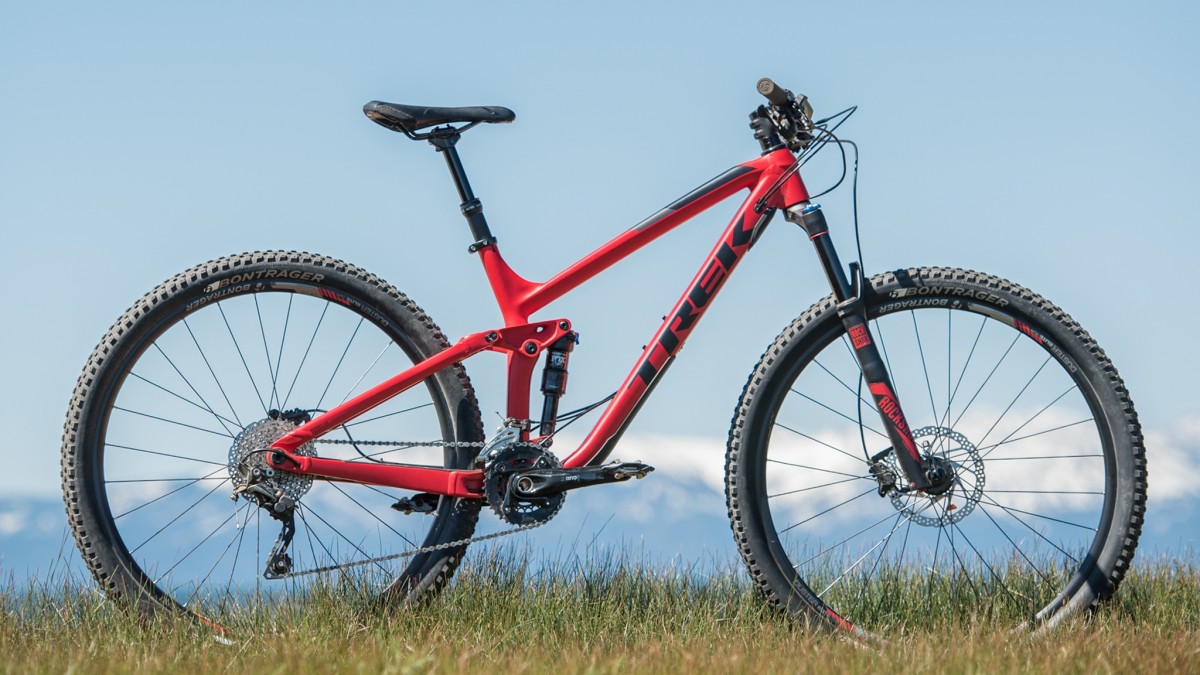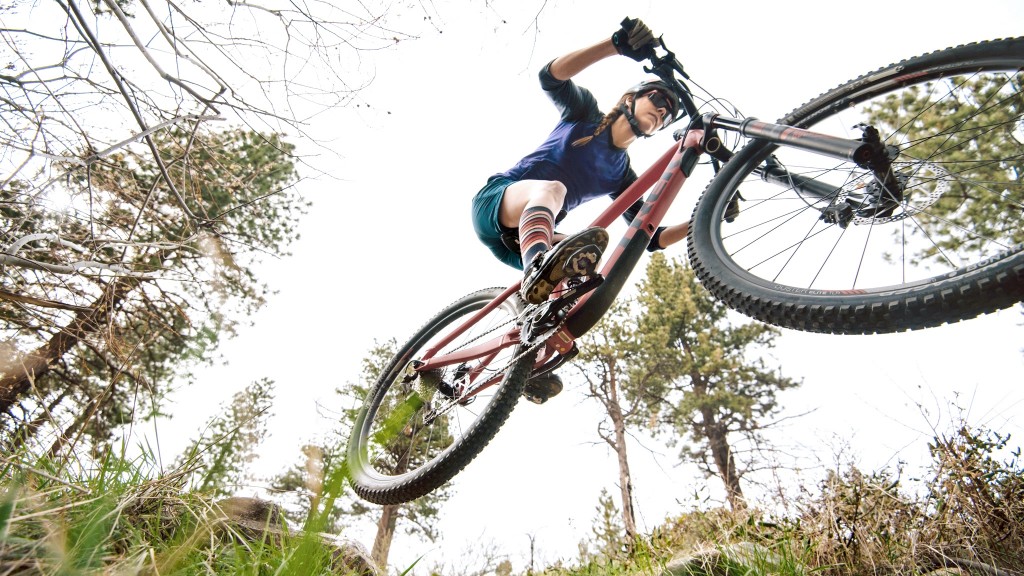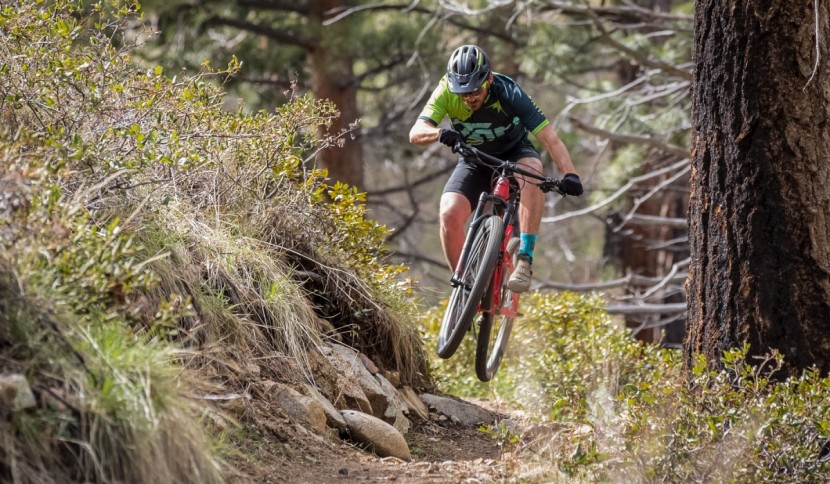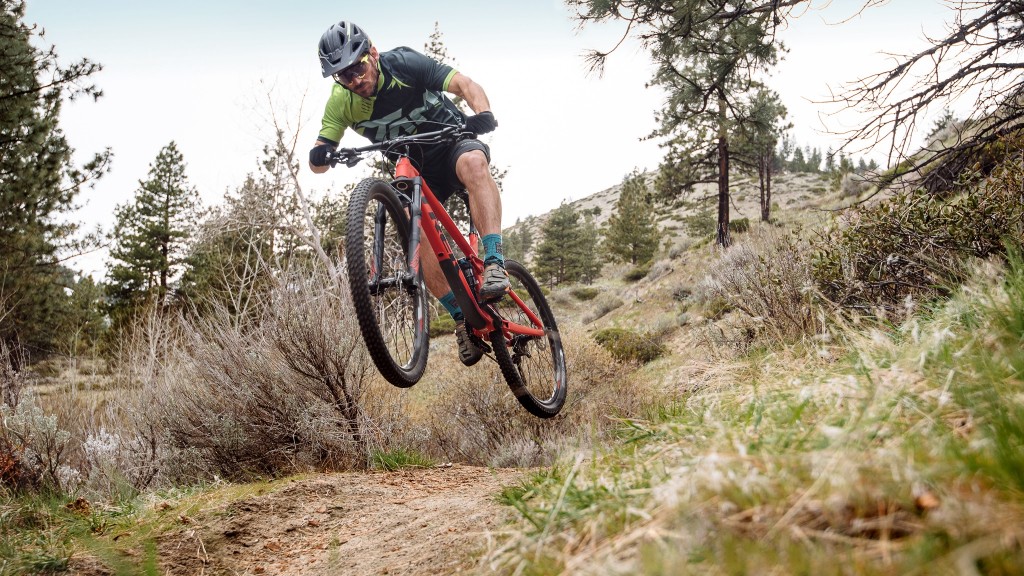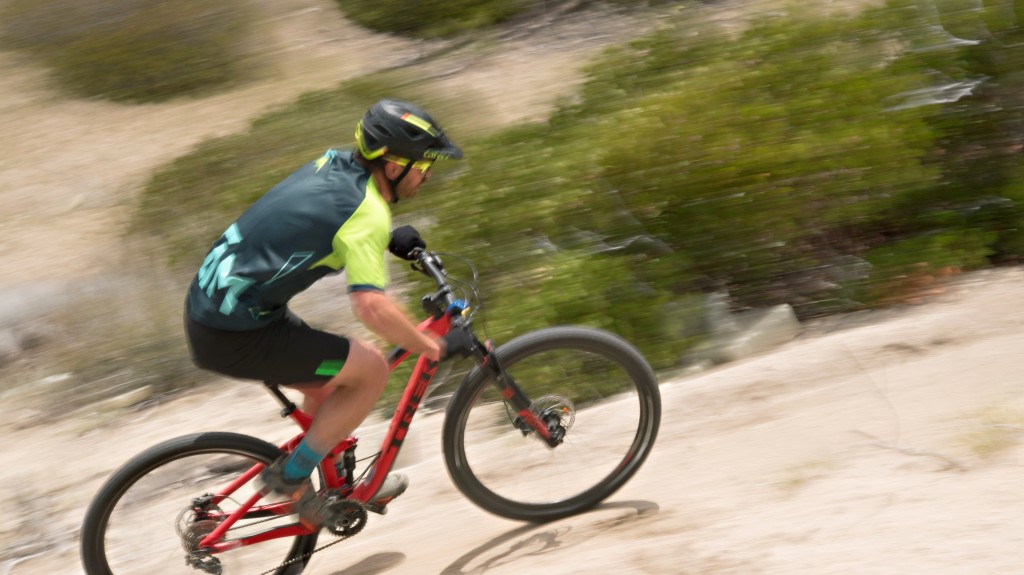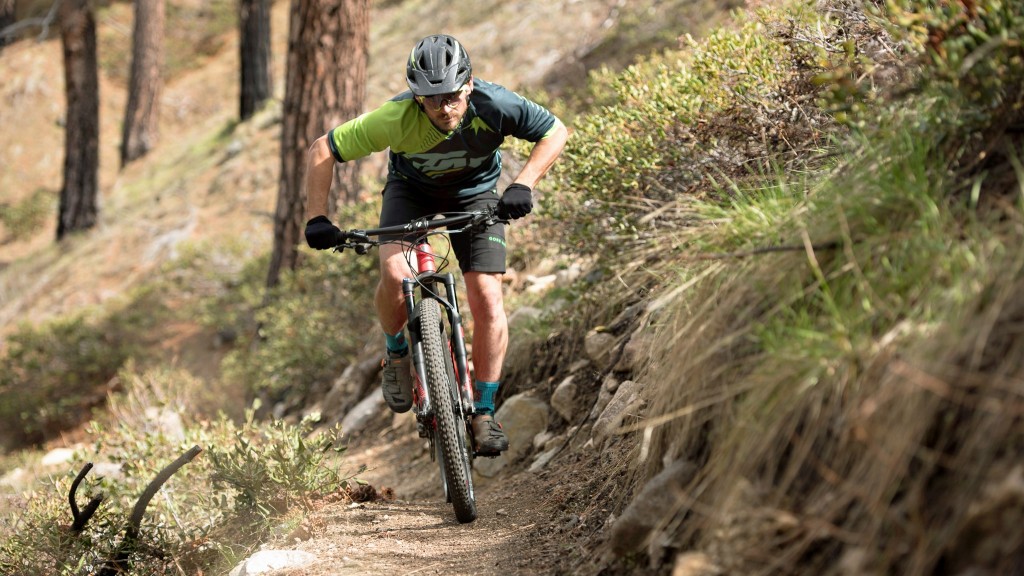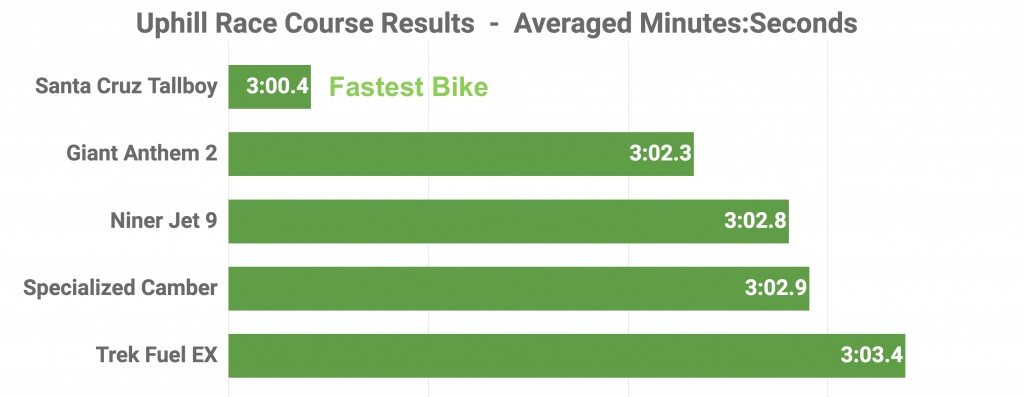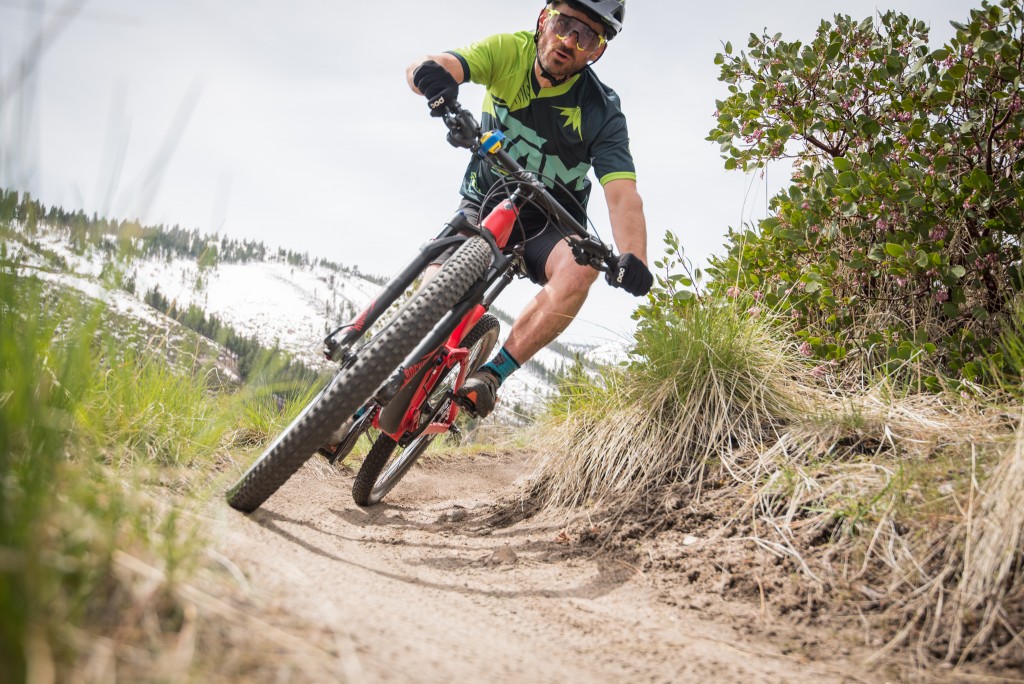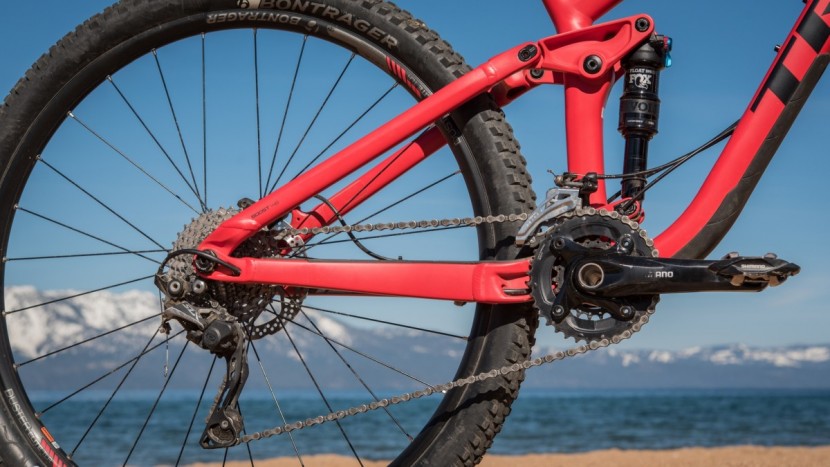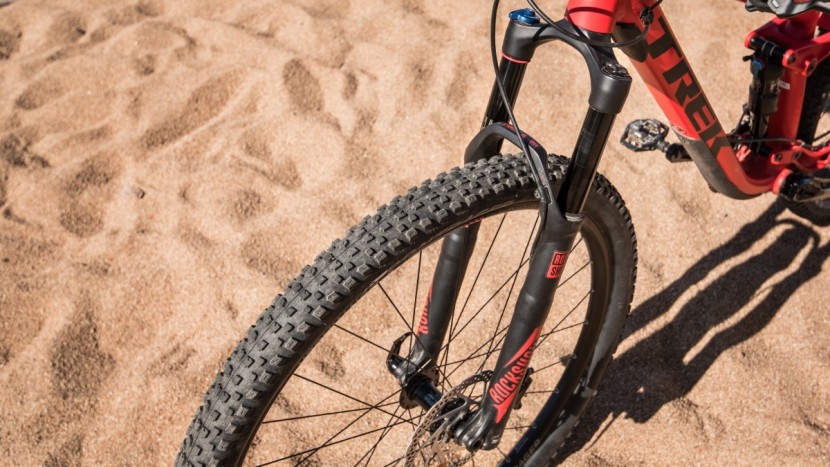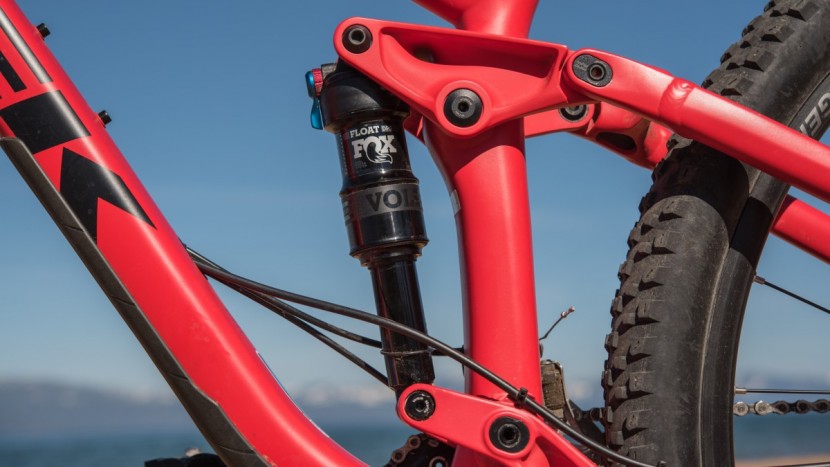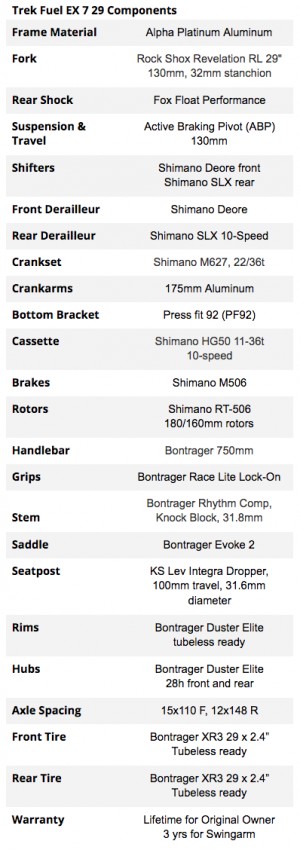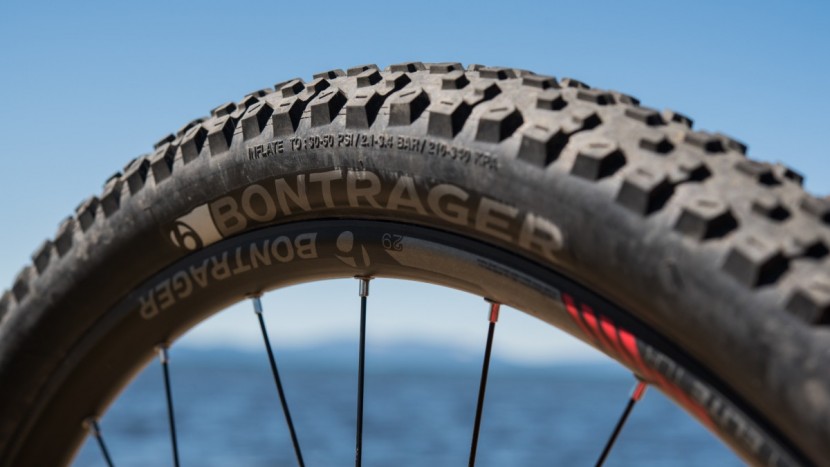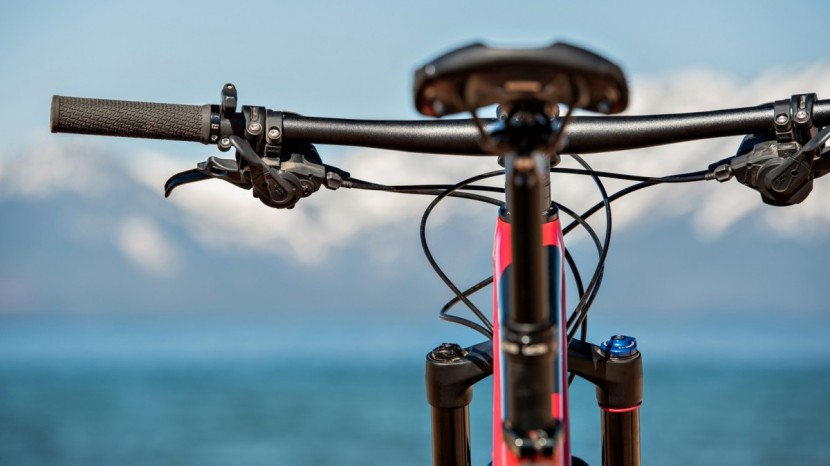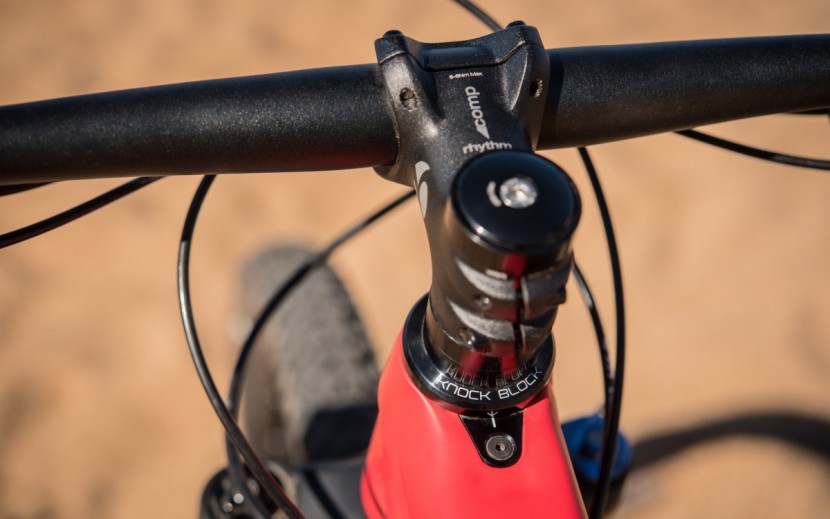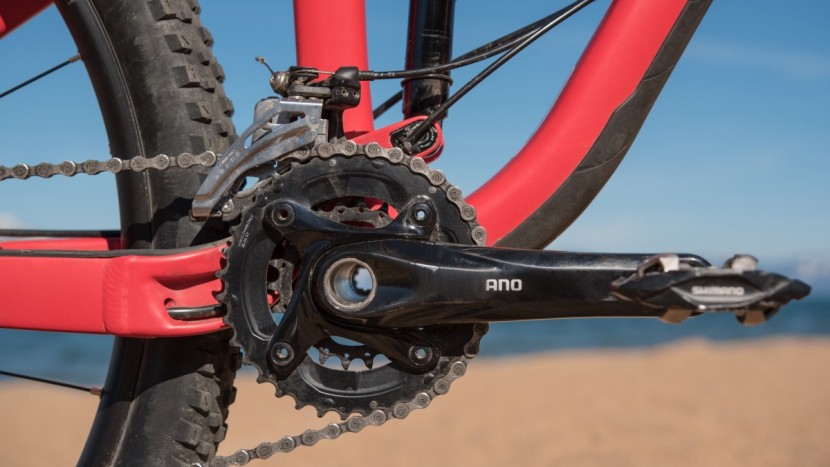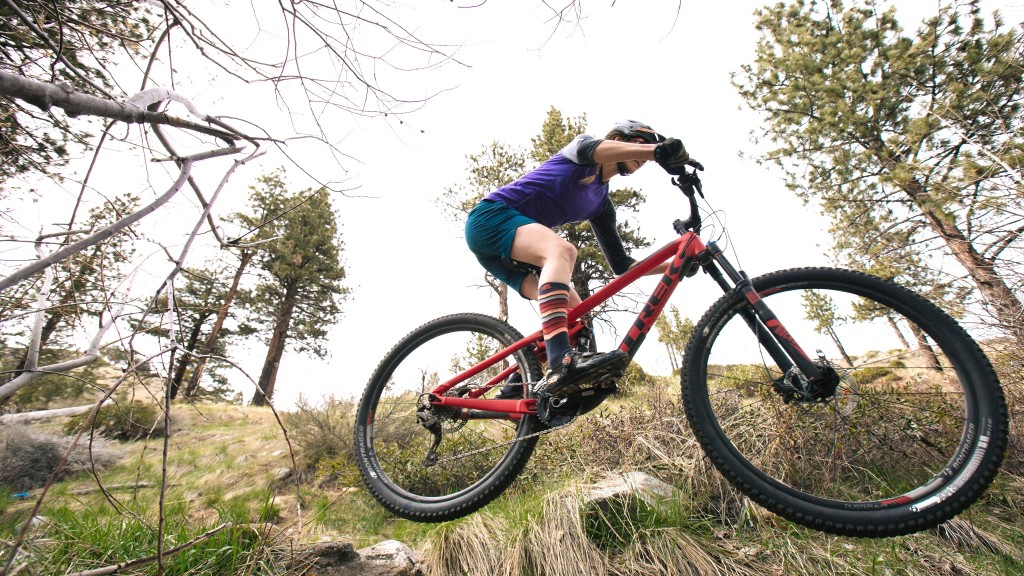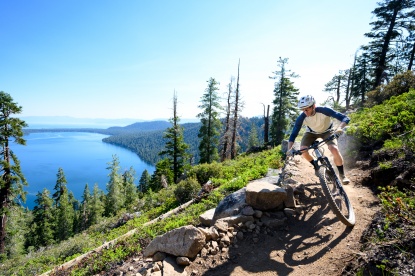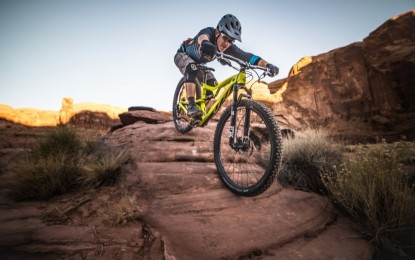The Fuel EX is a great option for riders seeking the safety net of stability provided by a little extra travel and true 29er characteristics, but who don't want to stray far from cross country style terrain. This bike handles a wide variety of trails but is a little too sluggish in the corners to confidently tackle steeper and tighter turns. Those seeking a more aggressive downhill feel while retaining climbing skills should consider the well-rounded Santa Cruz Tallboy or the Ibis Ripley LS for its nimble attitude.
Trek Fuel EX 7 29 2017 Review

Our Verdict
The Fuel EX is a great option for riders seeking the safety net of stability provided by a little extra travel and true 29er characteristics, but who don't want to stray far from cross country style terrain. This bike handles a wide variety of trails but is a little too sluggish in the corners to confidently tackle steeper and tighter turns. Those seeking a more aggressive downhill feel while retaining climbing skills should consider the well-rounded Santa Cruz Tallboy or the Ibis Ripley LS for its nimble attitude.
Our Analysis and Test Results
2017 Analysis and Test Results
Four of our bike testers raced five short-travel trail bikes to find out which performs the best. The Trek Fuel EX 7 29 went head to head with the 2017 Santa Cruz Tallboy D 29, 2017 Niner Jet 9, 2017 Specialized Camber Comp 29, and 2017 Giant Anthem 2. Then we compared them to all the other trail bike's we've tested. Here's what we found out.
Fun Factor
The Fuel EX is a fun bike for riders who want efficient output for their energy and enjoy holding speed. This bike is all business with its predictable handling attributes and reliable downhill performance. While the Fuel EX may not have an especially large appetite for playing around or boosting trail features, going fast is fun.
We found the Fuel EX to lack quickness and responsiveness. The Ibis Ripley LS is far more responsive to rider input and offers faster reaction time. It does not have the same insatiable appetite to be airborne or to ride its back wheel as the Santa Cruz Tallboy. What this bike lacks in spirited and lighthearted attitude, it makes up for in straight line confidence and its ability to hold speed. The Fuel EX is a fast feeling bike that lacks in cornering and flickability, yet maintains a fun feel in its own right. Once testers got a grasp on how the Fuel likes to operate, the fun-factor seemed to improve. Some folks prefer the fun of driving a muscle car to that of a rally car.
The KS Lev Internal dropper post makes for an aggressive attack position aboard the Fuel EX. Dropping the seat out of the of the way helps you compensate for this bike's lack of quickness. Hopping over logs or rocks is made slightly easier by not needing to divert your attention to dodging a seatpost.
Testers found that cornering confidence is severely limited by the Bontrager XR3 Expert tires. While the 29 x 2.4" size offers plenty of rubber and mass, the shoulder knobs are weak and not well-defined. Testers found the washy tires to limit the fun factor as it discourages riders from aggressively exploring new lines due to the risk of losing traction. In our experience, slapping what Bontrager calls “cross country performance” tires onto a trail bike isn't a recipe for a particularly fun ride.
The focused, business first Fuel Ex earns a 3 out of 10 for fun factor. The majority of bikes tested offer more playful attitudes.
Downhill Performance
We find the Trek Fuel EX to be a capable descender that lacks sharp precision. When the rocks and roots get chunky, the Fuel holds its own. The bike's geometry feels composed and stable through the chunder. The 67.2-degree head tube angle seems slack enough that, barring a poor line choice, you won't be ejected over the bars. The short chainstays allow for a nice stiff feel in the rear of the bike and provide stability at speed. Testers praise the KS Lev Integra dropper post, stating that it really opened the door for a more confident descent. Handlebars that measured out to only 750mm felt old-school. Adding a wider bar might add even more confidence and stability.
Our testers find the Fuel EX to be a fast descender. Many 29ers mask speed well, and this bike is no different. In other words, riders may not feel the true amount of speed they are carrying. The ride is smooth and composed. The Fox Float Performance EVOL rear shock is a noble performer when paired with Trek's ABP suspension and provides a damp and predictable ride. The Rock Shox Revelation RL is not a source of contention amongst most testers, who state the fork did a fine job. One tester is not so pleased with the fork. He cited that when stepping off technical sections the fork felt very springy and fast on the rebound, an adjustment he was unable to tune out.
The Santa Cruz Hightower is a far more capable descender with similar travel numbers. The Ibis Ripley LS shares similar levels of capability with much more precision.
OutdoorGearLab testers are very split on the downhill handling and confidence provided by the Fuel EX. Half of our testers feel this is a relatively nimble and confident descender. Other testers feel this bike is tall, resulting in the dreaded feeling of being on top of the bike rather than in the bike. The interesting part of this disagreement among testers is that there is no real pattern of rider height or body type that allowed us to draw a reasonable conclusion as to why certain riders felt this way. One consistent black mark on the Fuel EX's downhill handling are the Bontrager XR3 tires. It's difficult to make a commitment to adjust lines or work the slightest bit against the flow of the trail for fear of losing your front wheel. We feel these tires have a poor braking bite and would be a liability riding in wet locations.
We find the 2x10 drivetrain to be a curse and a blessing when descending. On one hand, there is a much stiffer high gear thanks to a 36 tooth big ring. Thanks to this harder gear, you can put more power down on the downhill and go faster if the trail allows. On the other hand, the gearing is closer together on a 2x10 setup, and multiple testers noted that they had to double shift to get the jump in gearing they desired. It can feel like a lot of shifting. We did not find a significant amount of dropped chains in our testing, but we weren't riding excessively rough terrain.
The Trek's capable but lackluster downhill performance rates a 4 out of 10. It's respectable within its travel range.
Climbing
The Trek Fuel EX is a capable climber offering low rolling resistance and plenty of gears to choose from. The presence of a true granny gear is a nice luxury to have on steeper or longer climbs. The tradeoff for riding in this easy gear is, while you save a lot of energy, you are typically creeping up the hill and don't have the torque needed to get up and over punchy climbs and trail obstacles. One tester finds himself constantly shifting due to the closer gear ratio of a 2x10 setup. This bike has the longest reach among our test bikes, which makes for a roomy cockpit. This is a nice characteristic for climbing as riders can move around to weight the bike as needed. The cockpit is not too long and did not stretch riders out.
The climbing motion feels efficient, although testers cite a significant amount of pedal bob when climbing in the Fox Float's Open position. This is especially noticeable when in a standing climbing position. When seated, the Fuel EX feels more like an effective and energy-sipping climber. We measured the Fuel's seat tube angle at 76.5 degrees, which made it one of the steepest in the test. The steep seat tube angle results in an aggressive pedaling position as riders are more on top of the cranks. Looking for better outright climbing skills? The Santa Cruz Tallboy and the ultra efficient Yeti SB4.5 are better options.
Testers utilize the Open-Medium-Firm adjustments often when aboard the Fuel EX. The Firm setting is certainly the most efficient but creates some harsh feedback from the trail surface. We recommend saving the Firm setting for climbing paved roads, dirt roads or smoother double track. The Medium setting appears most effective in eliminating the majority of pedal bob while still maintaining some of its trail-smoothing properties. One tester notes that the lever for this adjustment was difficult to reach as the shock is mounted vertically and tucked low in the front triangle.
As mentioned previously, the Fuel EX carries momentum well. This is no different when climbing. When approaching a steep rocky pitch or navigating a short, punchy and rooty climb, the Fuel EX uses its momentum to conquer. We find that it requires a head of steam, the correct gear, and a little body language and this bike is willing to charge right up most obstacles put in front of it. Weighting the rear tire sufficiently on roots or slick rock is something that requires a fair amount of attention as the Bontrager XR3 tires don't hook up particularly well.
We find that despite sporting the longest wheelbase among test bikes, the Fuel navigates switchbacks well enough and doesn't feel too hard to steer. It's a tall task to disrupt the momentum of the 29er. It's also hard to get the momentum rolling. There is a penalty for stalling out on climbs, and it takes a fair amount of work get them moving quickly again, especially when aimed uphill.
The Fuel EX earns a 6 out of 10 for its effective climbing skills. The 110mm Santa Cruz Tallboy is a far better option with a 9 of 10.
Our timed testing found the Fuel EX to be the slowest climber out of our five short travel test bikes. That pedal bob and sluggish handling on the switchbacks took a toll. It clocked in behind the speedy Santa Cruz Tallboy and the sharp-handling Giant Anthem.
Cornering, Handling and Body Language
We found that, while the Trek Fuel EX doesn't change the way we think about 29er handling, it performs dutifully. Cornering is predictable and does require a gameplan when setting up. This is not the kind of bike that can go into a corner crooked and still salvage speed. The rider position feels inherently tall, but the presence of the KS Lev dropper post opened the gate for the Fuel EX to handle well. The ability to get low in the corners on a taller bike is critical.
Our testers describe turn initiation as solid, but it requires a fair amount of body language. We weighed this bike at 31 lbs 12 oz in the 18.5" size we tested. While this is a substantial amount of heft, testers did not report any fatigue from whipping it around. Short chainstays make it easy to lift the front end skyward for manuals or wheelies. However, the heavy front end discourages such behavior.
We don't want to beat a dead horse, but the Bontrager XR3 tires are a serious strike against the Fuel EX. We find that the tires offer limited corner control. The round design of the “shoulder” knobs didn't clearly define the breakaway of the tires. Testers have to be careful to not lay the bike over past the washout zone as the tire doesn't provide proper warning. The narrower bars mounted to the Fuel didn't jump out at our testers as a serious issue. That being said, cornering abilities would only improve with a wider bar.
Ease of Maintenance
Consumers should consider how difficult their shiny dream bike is to maintain. While it is easy to get hung up on performance or price, serviceability is important too. Suspension links and pivots require service every so often to keep running smooth and quietly — forks, rear shocks, drivetrains, brakes and dropper posts do as well.
Trek full suspension bikes strike a good balance of durability and relative ease of maintenance. The bearings have a solid lifespan and torque values are printed on the hardware. This cuts down on the research time prior to servicing your bearings. The pivots are a bit more complicated to work with than your standard 4-bar suspension system, however. The RockShox fork has a shorter recommended maintenance intervals than Fox alternatives. We rate the bike a bit lower as a result. On the other hand, we rate it higher for its Fox rear shock, which has longer service intervals than a RockShox would. The Shimano brakes are easer to work on than SRAM options, so we rate those higher.
Frame Design and Suspension Overview
The Fuel EX utilizes Trek's Active Braking Pivot (ABP) suspension design. ABP suspension features a pivot point at the rear axle, which allows the suspension to move freely regardless of braking forces. The shock is mounted to the rocker link and is completely independent of the front triangle. This system is not known to be the most progressive, meaning it reacts similarly to small bumps and bigger, harder hits. More progressive air shocks, which ramp up as they move through their stroke, help combat this shortcoming.
The Trek Fuel sports 130mm of rear wheel travel, making it the longest travel bike in our test. Trek built the Fuel EX with adjustable geometry to allow for 27.5+ wheels. Since we tested this bike as a 29er, we will focus on the Low/29 setting. The head angle measured to 67.2 degrees and we measured the chainstays at 435mm, which is right in line with the rear ends of the other 29ers in our test class.
Build
The Fuel EX 7 provides exceptional performance and comes outfitted with exceptional build specifications.
The Fox Float Performance Evol rear shock is a rock solid performer. All testers state that they use the Open-Medium-Firm lever extensively and are complimentary of its usefulness.
Wheels and Tires -- The Fuel EX 7 rolls a Bontrager Duster Elite wheelset. These rims don't jump out in a positive or negative light. The hub engagement is solid with no noticeable dead spot.
The Bontrager XR3 Expert 2.4" tire has a nice footprint. The tread pattern, on the other hand, is decisively cross country oriented. The tread is not aggressive, and the shoulder knobs are rounded. In wet climates, we feel these tires would make for a difficult riding experience.
Groupset -- The EX 7 sports a Shimano 2x10 drivetrain with a Deore front derailleur and an SLX rear derailleur. The decision to have a front derailleur on this bike is discussed in detail in the body of this review. Regardless of your feeling on the matter, the 2x10 system worked well with crisp shifting and no dropped chains.
Shimano M506 brakes provide solid stopping power in the wet to dry, hardpack to sandy conditions during out test. These brakes do not have especially impressive modulation, giving riders the on or off feel.
Handlebars, Seat and Seatpost — Trek set the Fuel EX 7 up with a KS Lev Integra dropper post. The Lev is a rock solid cable-actuated performer that really sets this bike apart. The post functions flawlessly and allows for more aggressive riding.
Bontrager aluminum bars are installed on the front of the Fuel EX. The 750mm width is slightly narrower than is typical in this day and age. However, testers do not find this to be a major issue.
The Bontrager Evoke 8 saddle does its job and doesn't cause any testers a significant amount of pain.
Notables — We appreciate the water bottle cage option inside the front triangle.
Build Options
We tested the Fuel EX 7 29 which carries a $2599.99 price tag.
The Fuel EX 5 29 retails for $2,199 with a RockShox Sektor Silver RL fork and a Rock Shox Deluxe RL shock. Shifting duties are performed by a Shimano Deore 2x10 drivetrain, and the brakes are Shimano M315. The EX 5 build would be fantastic for someone who enjoys a mellower, less aggressive ride and doesn't mind a rigid seat post and downgraded brakes.
The Fuel EX 8 is a step-up from our test model and retails for $3,199. This build kit comes outfitted with a Fox Float 34 Rhythm fork and a trek-tuned Fox Float Performance EVOL shock. The drivetrain is a crisp Shimano XT 2x10 setup and stopping power is provided by Shimano Deore brakes. This model is outfitted with the same internally routed KS Lev dropper post as our test model.
The EX 8 build would be a great option for someone who puts value in a slightly crisper shifting feel and a plusher fork.
Value
Trek has a reputation for producing performance bikes at a middle-of-the-road price point, the Fuel EX 7 falls right in line. Our testers are not blown out of the water by its performance, and some raised an eye to the presence of a 2x10 drivetrain on a 2017 model full-suspension bike. That being said, an SLX drivetrain and an internally routed dropper post are reasonable specifications for a bike with a $2,599.99 price tag.
Suggested Upgrades
Immediately slapping some more aggressive tires on this bike would go a long way to improving its performance.
Conclusion
The Trek Fuel EX 7 is a 130mm trail bike that is true to its 29er roots. This bike holds speed, is confident when faced with rocks and roots, and can climb efficiently and painlessly. The Fuel EX is a quick descender but may not be as suitable for gnarly and steep terrain as other bikes in this test class. The performance quality paired with the impressive specifications make this a great option for the rider who wants a true 29er and doesn't feel the need to get too aggressive.


